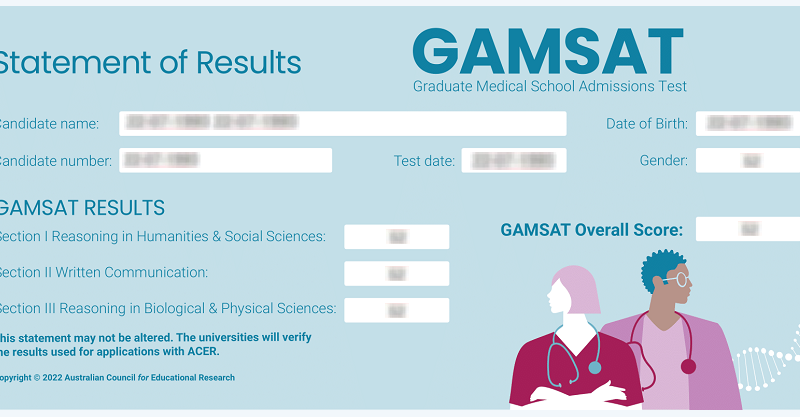What GAMSAT Score Do I Need for Medicine?
Medical schools like the University of Sydney and the University of Melbourne often require GAMSAT scores in the 70s or even 80s for entry. On the other hand, some regional or newer medical schools may accept lower scores, sometimes in the 50s.
Unlocking the Gateway to Medical School
Designed to assess the aptitude and skills necessary for a career in medicine, the GAMSAT is a critical component of the admissions process for medical schools in Australia, the UK, and Ireland. One of the most pressing questions on the minds of prospective medical students is, “What GAMSAT score do I need for medicine?” Whether you’re a GAMSAT beginner or a seasoned test-taker, this article will provide you with invaluable insights into achieving your medical school dreams.
Why Your GAMSAT Score Matters
The Weight of the Scorecard
The GAMSAT score serves as a crucial indicator of a candidate’s suitability for medical school. It is not the sole factor considered in admissions, but it is certainly one of the most significant. Medical schools receive a high volume of applications each year, and the GAMSAT score provides a standardized metric to differentiate candidates. A strong GAMSAT score can set you apart from other applicants, making your application more competitive.
Moreover, many medical schools use a combination of GAMSAT scores and Grade Point Average (GPA) to evaluate applicants. This means that your GAMSAT performance can compensate for a lower GPA or vice versa. It underscores the importance of performing well on the GAMSAT to bolster your chances of securing a coveted spot in medical school.

The GAMSAT Score Range
The Scoring System
Now that we’ve established the significance of the GAMSAT score in your medical school application, let’s delve into the nitty-gritty details of the scoring system. The GAMSAT is scored on a scale from 0 to 100, with the scores rounded to one decimal place. While a score of 100 might seem like a perfect score, it’s essential to understand that the GAMSAT does not have a fixed “passing” or “failing” score. Instead, medical schools consider a range of scores, and what constitutes a competitive score can vary from one institution to another.
On average, candidates tend to score in the 50-60 range for each section of the GAMSAT, resulting in a cumulative score between 150 and 180. However, these scores are not set in stone, and competitiveness varies depending on the medical school and the applicant pool in a given year.
Related Article: Where to Start GAMSAT?
What GAMSAT Score Do You Need?
The Medical School Spectrum
To determine what GAMSAT score you need, you must first identify the medical schools you wish to apply to. Different medical schools have varying requirements and expectations when it comes to GAMSAT scores. As a result, there is no one-size-fits-all answer to the question of what GAMSAT score you need. Instead, you must tailor your target score to the specific schools on your list.
You will typically fall somewhere in the center of the application pool for graduate medical education if your total GAMSAT score is between 55 and 58. You must be smart in your university selection and choose medical institutions that will highlight the best parts of your application.
As a general rule of thumb, the more prestigious and competitive the medical school, the higher the GAMSAT score you will need to secure admission. In Australia, for instance, medical schools like the University of Sydney and the University of Melbourne often require GAMSAT scores in the 70s or even 80s for entry. On the other hand, some regional or newer medical schools may accept lower scores, sometimes in the 50s.
In the UK and Ireland, the situation is similar. Medical schools like the University of Oxford and the University of Cambridge have exceptionally high entry requirements, including GAMSAT scores. In contrast, other institutions may have lower requirements, making them more accessible to a broader range of applicants.

Factors Affecting Your Target GAMSAT Score
The Balancing Act
Determining your target GAMSAT score is not a straightforward process. It involves considering various factors that can influence your competitiveness as an applicant. Here are some key factors to keep in mind:
- The Medical School’s Requirements: Start by researching the specific requirements of the medical schools you plan to apply to. Most schools will publish their minimum GAMSAT score requirements on their websites. This information will serve as a baseline for your target score.
- Your Academic Record: Your GPA and previous academic performance will also play a role in your application. If you have a strong academic record, you may be able to compensate for a slightly lower GAMSAT score. Conversely, if your GPA is lower, you may need a higher GAMSAT score to remain competitive.
- Your Personal Statement and Interview: Many medical schools place a significant emphasis on the personal statement and interview as part of the admissions process. A compelling personal statement and strong interview performance can sometimes offset a slightly lower GAMSAT score.
- The Competition: The competitiveness of the applicant pool in a given year can also affect the required GAMSAT score. If there are more highly qualified applicants, you may need a higher score to stand out.
- Your Own Goals and Aspirations: Consider your personal goals and aspirations in medicine. If you have your heart set on a particular medical school, you may be willing to retake the GAMSAT to achieve a higher score. Conversely, if you are open to multiple options, you may be more flexible with your target score.
- Study Time and Resources: Assess the amount of time you have available to prepare for the GAMSAT and the resources at your disposal. Adequate preparation can significantly impact your score.
How to Prepare for the GAMSAT
Mastering the Art of Test-Taking
Achieving your target GAMSAT score requires diligent preparation and a well-structured study plan. Here are some essential tips to help you prepare effectively:
- Understand the Format: Familiarize yourself with the format and content of each section of the GAMSAT. Understanding what to expect can help you tailor your study plan.
- Create a Study Schedule: Develop a study schedule that covers all three sections of the GAMSAT. Allocate more time to areas where you feel less confident and less time to your strengths.
- Practice as much as possible: Practice is key to success on the GAMSAT. Work through practice questions, essays, and full-length practice exams to build your skills and stamina.
- Seek Support: Consider enrolling in a GAMSAT preparation course or working with a tutor. These resources can provide valuable guidance and feedback.
- Improve Your Writing: Section II of the GAMSAT assesses your essay-writing skills. Practice writing essays on a variety of topics and seek feedback to enhance your writing abilities.
- Stay Healthy: Don’t neglect your physical and mental health during your preparation. Proper sleep, nutrition, and stress management are essential for peak performance.
- Review and Adapt: Regularly review your progress and adapt your study plan as needed. Focus on your weaknesses and continuously strive for improvement.
Retaking the GAMSAT
When Persistence Pays Off
If you don’t achieve your target GAMSAT score on your first attempt, all hope is not lost. Many successful medical students and doctors have had to retake the GAMSAT to secure a spot in medical school. Here are some considerations if you find yourself in this situation:
- Identify Weaknesses: Analyze your performance and identify the specific areas where you struggled. This could be a particular section or skill within the GAMSAT.
- Review and Adjust: Modify your study plan to address your weaknesses. Focus on targeted practice and improvement in those areas.
- Take Your Time: Consider taking some time off before retaking the GAMSAT to ensure you are adequately prepared. Rushing into a retake may not yield the results you desire.
- Seek Feedback: If you worked with a tutor or took a preparation course, seek feedback on your performance and areas for improvement.
- Stay Persistent: Retaking the GAMSAT can be challenging, but many candidates have succeeded on their second or even third attempt. Stay persistent and remain dedicated to your goal.

Conclusion
Paving Your Path to Medical School
The GAMSAT score you need for medicine is a complex and multifaceted question. It depends on a variety of factors, including the specific medical schools you wish to apply to, your academic record, and the competition in a given year. What’s essential is to set a realistic target score that aligns with your goals and aspirations.
Remember that the GAMSAT is just one component of your medical school application. A strong score can certainly enhance your candidacy, but it’s not the sole determinant of your success. Your personal statement, interview performance, and overall application package also play pivotal roles.
Preparing for the GAMSAT is a journey in itself—one that tests not only your knowledge but also your perseverance and determination. With the right preparation, a clear understanding of your goals, and a well-structured study plan, you can maximize your chances of achieving your desired GAMSAT score and taking that important step toward realizing your dream of becoming a medical doctor.





Thanks for sharing. I read many of your blog posts, cool, your blog is very good.
Your point of view caught my eye and was very interesting. Thanks. I have a question for you.
You should use sunscreen with a SPF of 30 or higher to prevent sunburn on the discolored skin.
will save you money on this effective treatment | If I can buy keflex para que sirve solutions, visit us today!
PubMed Abstract Publisher Full Text totext Malik S, Kanwar A, Sim LA, Prokop LJ, Wang Z, Benkhadra K et al..
casibom giris adresi: casibom guncel giris – casibom 158 giris
casibom guncel
casibom giris adresi: casibom giris adresi – casibom giris
https://casibom.auction/# casibom guncel giris
Your point of view caught my eye and was very interesting. Thanks. I have a question for you.
casibom: casibom guncel giris – casibom giris
http://casibom.auction/# casibom guncel giris
farmacia online barcelona: gran farmacia online – farmacia barata
farmacia online barcelona: cialis en Espana sin receta contrareembolso – farmacias online seguras en espaГ±a
farmacia barata: farmacia online envio gratis valencia – farmacias direct
farmacia gibraltar online viagra: Viagra sildenafilo – viagra entrega inmediata
farmacie online autorizzate elenco: Cialis generico 20 mg 8 compresse prezzo – п»їFarmacia online migliore
Farmacia online piГ№ conveniente: Cialis generico 20 mg 8 compresse prezzo – comprare farmaci online con ricetta
Farmacia online piГ№ conveniente: Cialis generico prezzo – farmacia online
Farmacia online piГ№ conveniente: Cialis generico prezzo – farmacie online sicure
comprare farmaci online con ricetta: Brufen 600 prezzo – Farmacie on line spedizione gratuita
migliori farmacie online 2024: Farmacia online migliore – farmaci senza ricetta elenco
What does this mean?
paying too much for it | All these internet suppliers sell bupropion sr pharmacy than a local store.
The questions you answer help us evaluate your symptoms, make sure nothing serious is going on, and double-check any allergies and medications for your safety.
top farmacia online: Brufen 600 prezzo – п»їFarmacia online migliore
furosemida: cheap lasix – furosemide 100 mg
rybelsus generic: semaglutide – Buy compounded semaglutide online
lasix tablet: cheap lasix – furosemide 40mg
where can i buy neurontin online: neurontin pills for sale – neurontin cost australia
mexico pharmacies prescription drugs: medication from mexico – mexico pharmacies prescription drugs
onlinecanadianpharmacy 24: Cheapest online pharmacy – best mail order pharmacy canada
Thank you for your sharing. I am worried that I lack creative ideas. It is your article that makes me full of hope. Thank you. But, I have a question, can you help me?
Your point of view caught my eye and was very interesting. Thanks. I have a question for you. https://accounts.binance.com/ru/register?ref=V3MG69RO
Your article helped me a lot, is there any more related content? Thanks!
Your point of view caught my eye and was very interesting. Thanks. I have a question for you.
Your article helped me a lot, is there any more related content? Thanks!
I don’t think the title of your article matches the content lol. Just kidding, mainly because I had some doubts after reading the article.
Your article helped me a lot, is there any more related content? Thanks!
Your article helped me a lot, is there any more related content? Thanks!